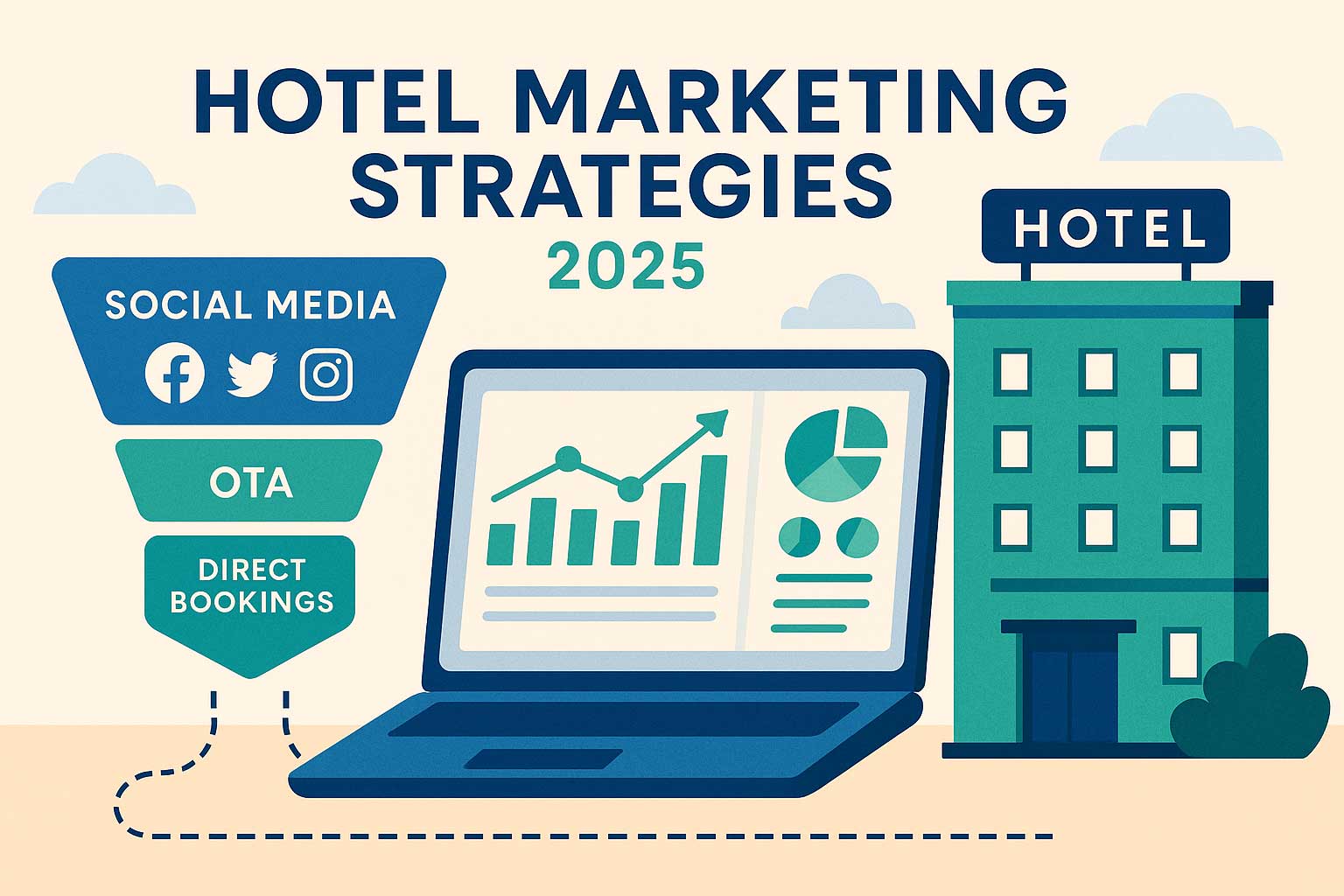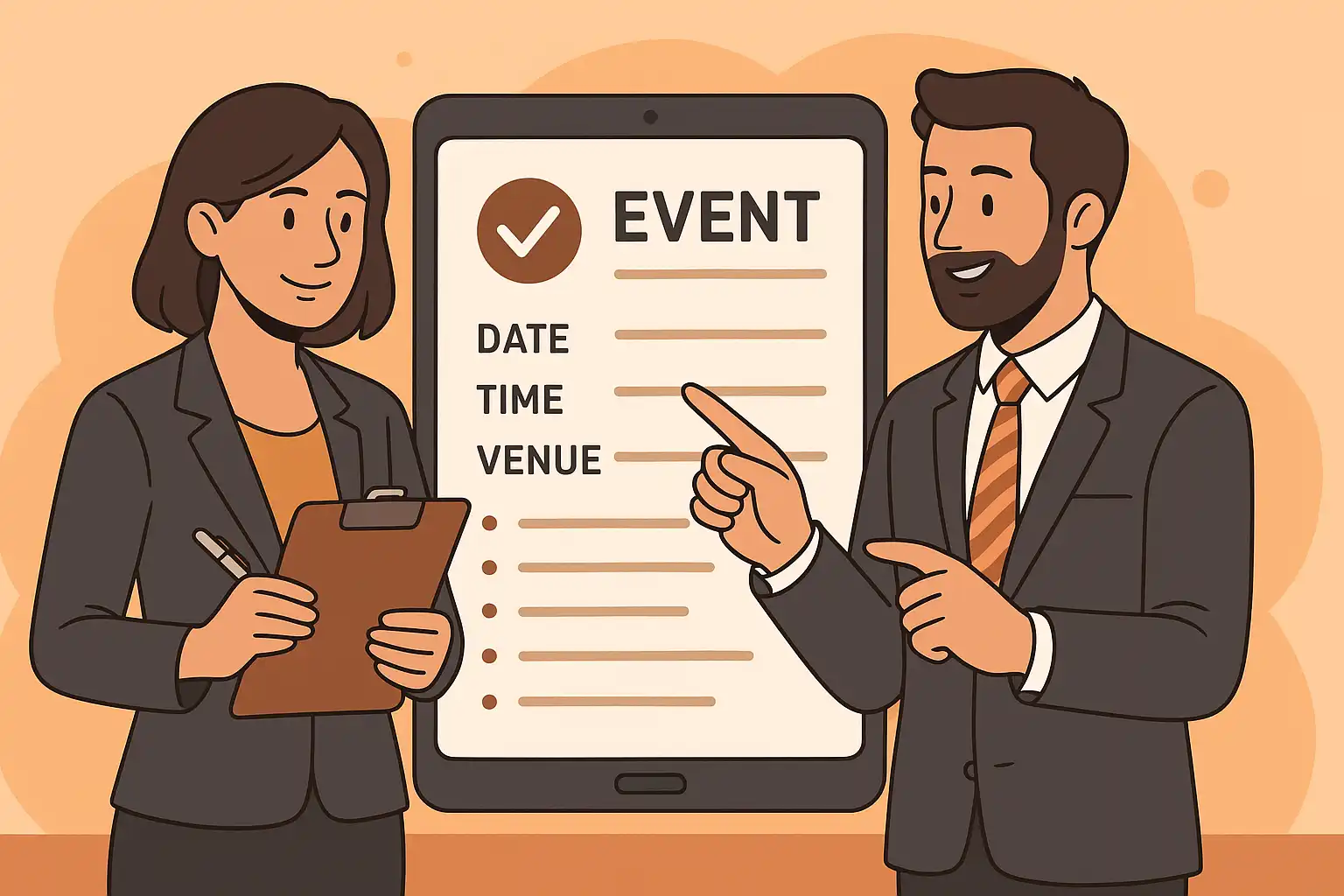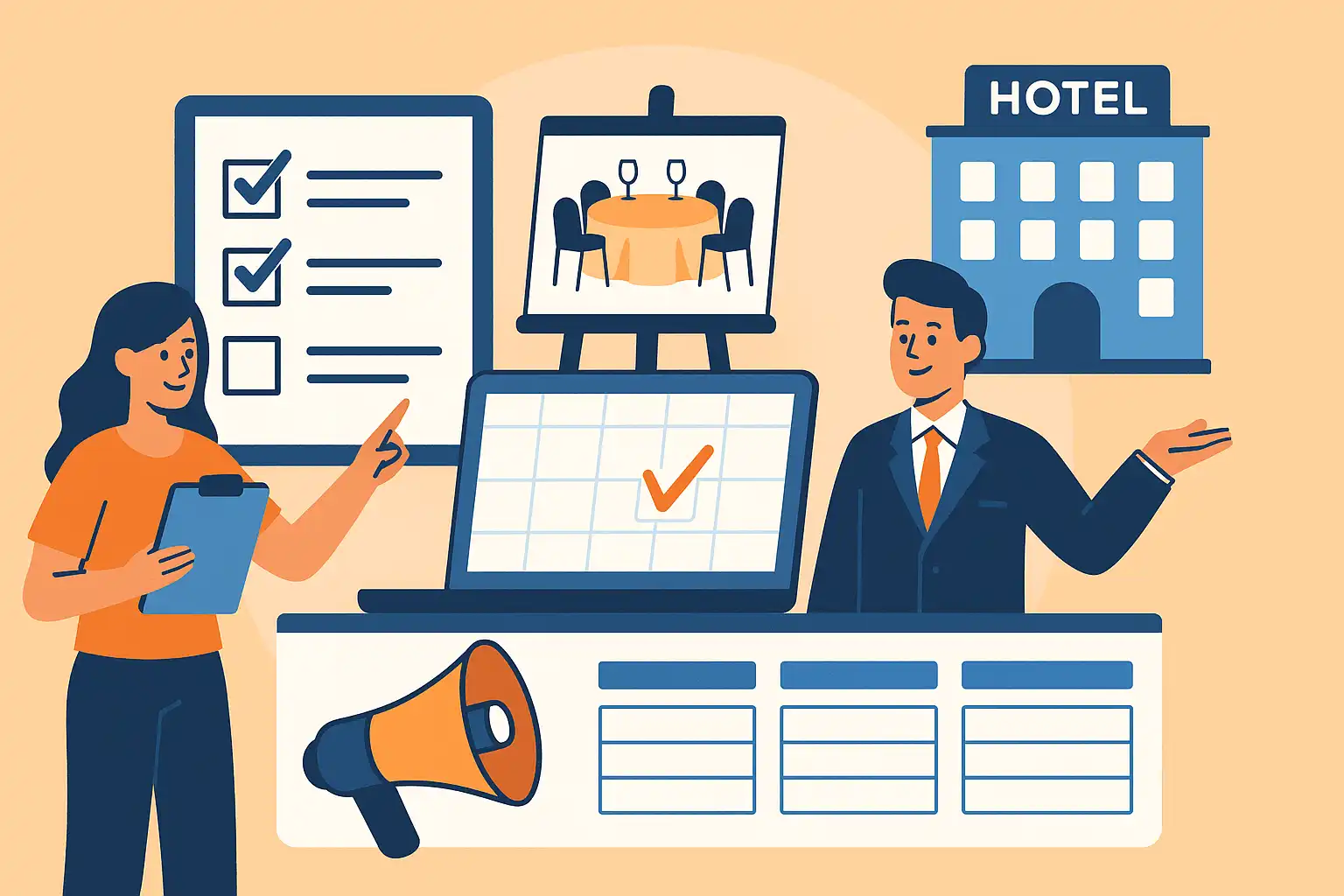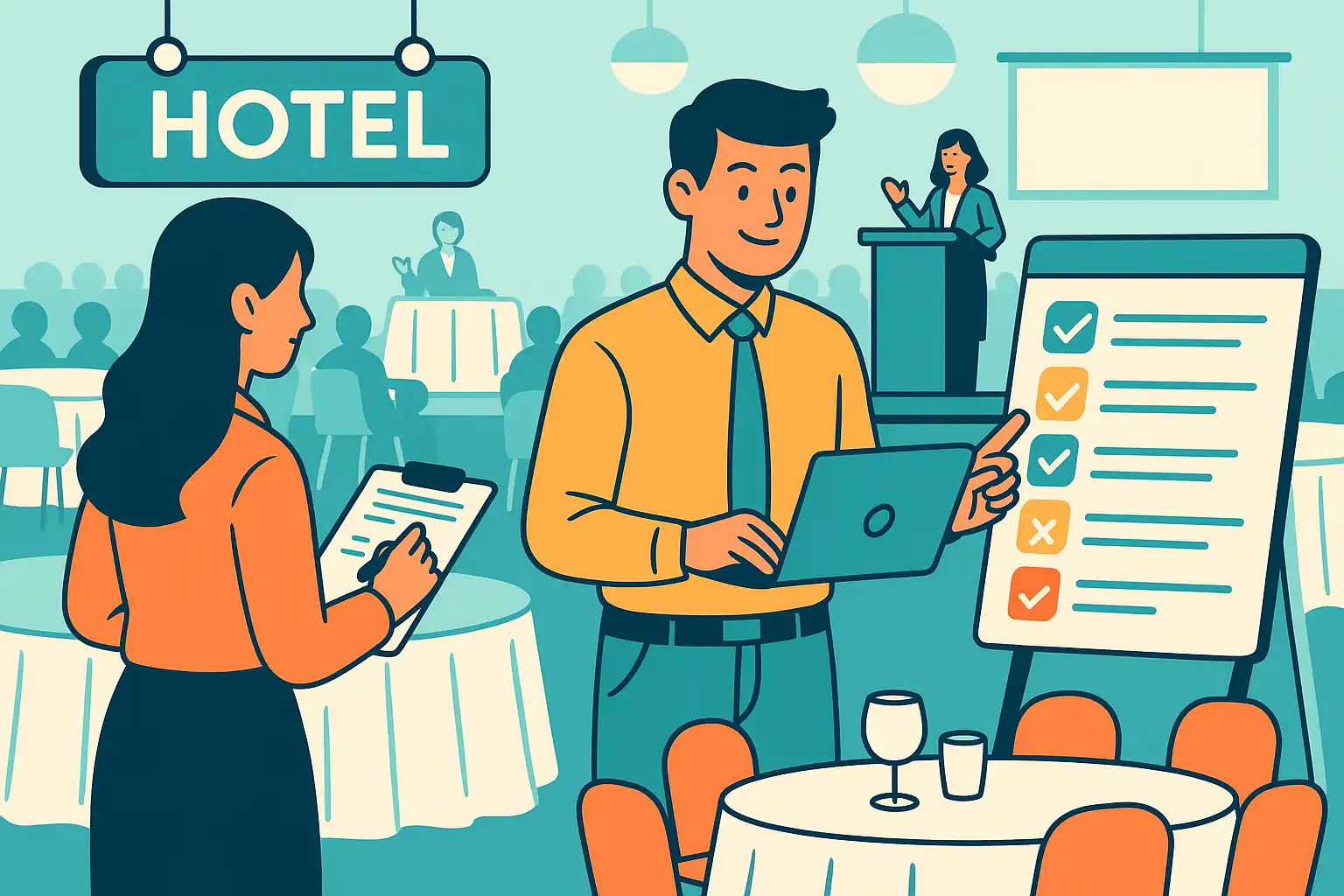Hotel Event Management: Guide to Successful Event Operations
Oct 20, 2025
 Mika Takahashi
Mika TakahashiPopular Categories
Hotel Technology & InnovationHotel Operations OptimizationDigital MarketingIndustry TrendsRevenue ManagementHospitality Industry
Popular Categories
Trending Post

Hotel Walk Letter Template: Professional Guest Communication

Online Travel Agents: What They Are and How They Work

Hotel Security Systems: Modern Protection Solutions

Hotel Advertising: Complete Guide to Boost Bookings and Revenue

25 Hotel Marketing Strategy Ideas for 2025: Complete Guide

AI Reservation Agent: Revolutionizing Hotel Booking and Guest Experience

PMS Communication: Streamlining Property Management Through Effective Guest Messaging
Table of contents
In today’s competitive hospitality industry, successful events can contribute 25-40% of a hotel’s total revenue through strategic room bookings, catering packages, and venue rentals. Hotel event management represents far more than simply providing a space—it’s a complex orchestration of multiple departments, precise timing, and meticulous attention to detail that can make or break a hotel’s reputation and bottom line.
Whether you’re managing corporate conferences, elegant weddings, trade shows, or intimate hotel business meetings, effective hotel event management requires a systematic approach that addresses every aspect of the guest experience. From initial inquiry to post event planning follow up, hotels must deliver flawlessly while managing countless moving parts behind the scenes.
This comprehensive guide will walk you through every essential component of hotel event management, providing you with the tools, timelines, and best practices needed to create memorable events that keep clients coming back and drive sustainable revenue growth.

What is Hotel Event Management
Hotel event management is the coordinated hotel event planning, execution, and oversight of all aspects of events within hotel properties. This specialized discipline goes far beyond traditional venue rental, encompassing everything from initial sales contact through post event evaluations to ensure every detail contributes to a successful event.
The scope of hotel events spans multiple categories, each requiring specific expertise and coordination. Corporate hotel conferences and business meetings form the backbone of many hotels’ group business, often featuring complex audio-visual requirements and detailed logistics. Social events, including weddings and celebrations, demand a different approach focused on creating memorable experiences and managing emotional expectations. Trade shows and exhibitions require extensive space planning and vendor coordination, while intimate gatherings call for personalized service and attention to detail.
Key stakeholders in hotel event management include dedicated hotel event planners who serve as the primary client liaison, hotel sales teams responsible for initial lead generation and contract negotiation, catering staff who manage all food and beverage operations, housekeeping teams who ensure spaces meet impeccable service standards, and venue coordinators who oversee setup and technical requirements. Each plays a key role in delivering the seamless experience that guests expect from professional events team.
The revenue impact of effective event management cannot be overstated. Beyond direct venue rental fees, successful events drive room bookings for event guests, generate substantial food and beverage revenue, and create opportunities for cross-selling additional hotel services. Many hotels find that group travel associated with events produces higher average daily rates and occupancy during traditionally slower periods, making hotel event management a critical component of overall financial performance.
Essential Components of Hotel Event Management
Hotel event management operates as an interconnected system where each component must work in harmony to deliver exceptional results. The complexity of managing multiple events simultaneously while maintaining the hotel’s other operations requires sophisticated coordination and clear communication channels between all departments.
Sales and Lead Generation
The foundation of successful hotel event planning begins with effective sales processes that convert inquiries into confirmed bookings. Professional hotel event managers understand that rapid response times can make the difference between winning and losing business, particularly in competitive markets where multiple venues may be pursuing the same event.
RFP (Request for Proposal) management demands prompt, detailed responses typically delivered within 24-48 hours of initial inquiry. This timeline requires sales teams to have immediate access to venue availability, catering options, room block information, and pricing structures. Leading hotels leverage technology to streamline this process, using automated systems that can generate preliminary proposals while sales staff develop customized solutions.
Hotel group booking quotas and room block allocation strategies form a critical component of the sales process. Hotels must balance the guaranteed revenue from event-related room bookings against the potential for higher-rate transient guests, particularly during peak periods. Successful sales teams work closely with revenue management to optimize this balance, often using historical data to predict actual pickup rates against blocked rooms.
Revenue management for meeting spaces and catering packages requires sophisticated understanding of demand patterns, seasonal fluctuations, and competitive positioning. Event spaces represent significant fixed hotel costs that generate maximum return when utilized effectively, making strategic pricing crucial for profitability. Many hotels implement dynamic pricing models that adjust rates based on demand, lead time, and competitive factors.
CRM systems for tracking leads from inquiry to contract signing provide essential data for optimizing sales performance and identifying opportunities for improvement. These systems enable sales teams to maintain detailed contact histories, track proposal response rates, and identify patterns in successful conversions. Advanced hotel CRM platforms integrate with other hotel systems to provide comprehensive views of client relationships and revenue potential.
Event Planning and Coordination
Once contracts are signed, the real work of event planning and coordination begins. Timeline development typically starts 6-12 months before the event date for larger functions, with detailed planning intensifying as the event approaches. This extended timeline allows for careful coordination of all elements while providing flexibility to accommodate changes and additions.
Banquet Event Orders (BEOs) serve as the blueprint for hotel event planning, containing detailed specifications for every aspect of the event planning from room setup and menu selections to audio-visual requirements and special requests. Creating comprehensive BEOs requires collaboration between multiple departments and serves as the primary communication tool for ensuring all teams are on the same page throughout the planning process.
Coordination between departments—sales, catering, housekeeping, engineering, and security—forms the backbone of successful event execution. Each department brings specialized expertise that must be integrated into the overall hotel event planning. For example, engineering teams ensure adequate power and HVAC capacity for large gatherings, while security personnel plan for crowd control and emergency procedures. Effective event managers facilitate regular inter-departmental communication to address potential conflicts and ensure seamless execution.
Pre-event meetings held 1-2 weeks before execution bring together all key stakeholders to review final details, confirm timelines, and address any last-minute changes. These meetings serve as quality control checkpoints where potential issues can be identified and resolved before they impact the guest experience. Documentation from these meetings becomes part of the final event timeline used during execution.
Venue and Space Management
Effective venue and space management requires deep understanding of how different room configurations can be optimized for various event types and attendee numbers. Function room allocation involves matching client needs with available spaces while considering factors such as natural light, accessibility, proximity to other hotel amenities, and technical capabilities.
Setup configurations must be carefully planned to optimize both guest experience and operational efficiency. Theater-style seating maximizes capacity for presentations and keynote sessions, while classroom arrangements facilitate interactive learning and note-taking. Boardroom configurations create intimate environments for high-level discussions, and reception-style layouts encourage networking and social interaction. Professional event planners understand how setup choices impact everything from audio-visual effectiveness to catering service efficiency.
Audio-visual equipment coordination and technical support have become increasingly critical as events incorporate more sophisticated technology requirements. Modern event guests expect seamless connectivity, high-quality projection capabilities, and reliable audio systems. Hotels must either invest in comprehensive AV infrastructure or develop strong partnerships with technology vendors who can provide specialized equipment and support.
Capacity planning involves multiple considerations beyond simple square footage calculations. Fire safety limits, social distancing requirements where applicable, and optimal guest flow all influence maximum occupancy numbers. Professional event managers also consider factors such as registration areas, networking spaces, and traffic patterns when determining appropriate capacity for each event space.
Backup space planning for weather contingencies or last-minute changes demonstrates the level of preparation required for successful event management. Outdoor events require detailed contingency plans including covered alternatives, while indoor events may need backup plans for technical failures or unexpected capacity changes. Well-prepared hotels maintain flexibility in their space allocation to accommodate these situations without compromising other events or hotel operations.

Accommodation and Room Block Management
Managing group accommodations requires sophisticated understanding of booking patterns, cancellation policies, and revenue optimization strategies. Room block negotiation involves balancing guaranteed room commitments with realistic pickup expectations, typically including 10-15% attrition clauses that protect hotels from significant revenue losses if actual bookings fall short of projections.
The standard 21-day cutoff period for group reservations allows hotels to release unbooked rooms back to general inventory while giving event organizers sufficient time to finalize their attendee lists. This timeline requires careful communication with event organizers to track pickup progress and adjust marketing efforts if bookings lag behind expectations.
Group rate structures and special amenities packages must be carefully designed to provide value to event attendees while maintaining profitable margins for the hotel. Successful packages often include complimentary wireless internet, welcome amenities, or access to hotel facilities such as fitness centers or business centers. These additions enhance the overall guest experience while encouraging direct bookings rather than third-party alternatives.
Rooming list management and VIP accommodation assignments require attention to detail and clear communication protocols. Event organizers often have specific requirements for room assignments, including accessibility needs, room types, and proximity to event spaces. Managing these requests while maintaining inventory control requires sophisticated reservation systems and experienced staff who understand both the event requirements and hotel operations.
Overflow hotel partnerships become essential during high-demand periods when a single property cannot accommodate all event attendees. Establishing relationships with nearby hotels ensures consistent service standards and seamless transportation arrangements for guests staying at alternative properties. These partnerships often include reciprocal arrangements that benefit all participating hotels during peak demand periods.
Check-in and check-out coordination for large groups requires careful planning to avoid lobby congestion and ensure efficient service for all hotel guests. Many hotels establish dedicated group check-in areas or extended hours to accommodate group arrivals, while also implementing express checkout options to streamline departure processes.
Food and Beverage Operations
Food and beverage operations often represent the most complex and visible aspect of hotel event management, requiring coordination between kitchen staff, service teams, and event coordinators to deliver memorable dining experiences. Menu planning begins with understanding the event’s purpose, guest demographics, and any specific dietary requirements or cultural considerations.
Seasonal ingredients and dietary restrictions have become increasingly important considerations in menu development. Modern event guests expect options for gluten-free, vegan, kosher, and other specialized dietary needs, requiring kitchens to develop systems for safe preparation and service of multiple menu variations. Professional catering teams maintain detailed protocols for preventing cross-contamination while ensuring all guests receive high-quality dining experiences.
Service style selection significantly impacts both guest experience and operational requirements. Plated service provides elegant presentation and precise portion control but requires larger service teams and more complex timing coordination. Buffet service offers variety and flexibility while reducing labor costs, but requires careful food safety protocols and attractive presentation throughout the service period. Cocktail reception formats encourage networking and social interaction while allowing for more flexible timing and space utilization. Family-style dining creates intimate, communal experiences but requires careful portion planning and service coordination.
Beverage packages must be structured to meet diverse guest preferences while maintaining cost control and responsible service practices. Open bar packages provide unlimited service for a fixed price, simplifying billing but requiring careful monitoring to prevent overconsumption. Cash bar arrangements place cost responsibility on individual guests while reducing host liability, but may impact guest satisfaction if not clearly communicated. Consumption-based pricing offers transparency and cost control but requires detailed tracking and reporting systems.
Kitchen coordination for multiple events presents one of the most challenging aspects of hotel food and beverage operations. Staggered service times and staff allocation must be carefully planned to ensure each event receives proper attention while maintaining quality standards across all functions. Professional kitchens use detailed production schedules and specialized equipment to manage multiple menus simultaneously without compromising food safety or presentation quality.
Special occasion requirements often define the success of social events such as weddings or milestone celebrations. Wedding cakes require specialized storage and presentation, kosher meals demand separate preparation areas and certified supervision, and corporate branding may involve custom menu cards or specialty cocktails that reinforce the event’s message. Attention to these details demonstrates the level of service that distinguishes exceptional hotels from basic venue providers.

Technology and Digital Tools
Modern hotel event management relies heavily on sophisticated technology platforms that streamline operations, improve communication, and enhance the guest experience. Event management software such as Cvent, Planning Pod, or hotel-specific platforms provide comprehensive tools for managing every aspect of the event lifecycle from initial inquiry through post event follow up.
These platforms typically include proposal generation capabilities that allow sales teams to quickly create professional presentations incorporating availability, pricing, and detailed specifications. Contract management features enable digital signatures and automated approval workflows that accelerate the booking process while maintaining proper documentation. Timeline and task management tools help coordinate activities across multiple departments while ensuring nothing falls through the cracks during busy periods.
Digital floor plan software has revolutionized space visualization and planning, allowing event planners and clients to see exactly how their events will look before setup begins. These tools enable real-time adjustments to accommodate social distancing requirements, optimize traffic flow, or incorporate last-minute changes without requiring physical mockups or extensive redrawing.
Mobile check-in apps and contactless service options have become standard expectations for many event guests, particularly following increased health and safety awareness. These technologies reduce wait times, minimize physical contact, and provide guests with greater control over their experience while generating valuable data for hotels about guest preferences and behavior patterns.
Virtual and hybrid event capabilities have expanded dramatically, requiring hotels to invest in live streaming equipment, reliable internet infrastructure, and technical support capabilities. Professional-grade cameras, lighting systems, and audio equipment enable hotels to serve clients who want to reach both in-person and remote audiences. Technical support teams must be trained to manage both traditional AV requirements and streaming technology simultaneously.
Digital signatures for contracts and BEO approvals have streamlined administrative processes while providing better documentation and faster turnaround times. These systems integrate with CRM platforms to maintain comprehensive records of all client interactions and approvals, reducing the risk of miscommunication and ensuring all parties have access to current information.
Event Execution and Day-of Coordination
The success of months of planning ultimately depends on flawless execution during the event itself. Staff briefings conducted 2 hours before event start time ensure all team members understand their roles, timing requirements, and communication protocols. These briefings cover everything from service standards and special requests to emergency procedures and key contact information.
Timeline management with 15-minute buffer periods between activities provides flexibility to accommodate inevitable minor delays while maintaining overall schedule integrity. Professional event managers understand that rigid timelines often create more problems than they solve, so building appropriate flexibility into the schedule allows for natural variations in guest behavior and minor operational adjustments.
Real-time communication via two-way radios or messaging apps enables immediate response to changing conditions and ensures all team members stay informed about schedule adjustments or special requirements. Modern communication systems often include GPS tracking and automated check-in features that help managers monitor staff deployment and response times during complex events.
Guest services coordination encompasses registration processes, transportation arrangements, and concierge assistance that can significantly impact the overall guest experience. Efficient registration systems minimize wait times while capturing important data for future marketing efforts. Transportation coordination ensures guests can easily travel between the hotel and off-site activities, while concierge services help guests maximize their experience during extended stays.
Emergency protocols and contingency planning become critical during large events where potential issues could impact hundreds of guests simultaneously. Professional event managers maintain detailed emergency procedures covering everything from medical incidents and severe weather to technical failures and security concerns. Regular drills and training ensure staff can respond quickly and effectively when situations arise.
Financial Management and Billing
Transparent financial management builds trust with clients while protecting hotel profitability throughout the hotel event planning and execution process. Event cost breakdowns must clearly separate venue rental fees, catering charges, AV equipment costs, and service charges to help clients understand value received and make informed decisions about optional services.
Deposit schedules typically follow industry standards with 25% due at contract signing, 50% required 30 days prior to the event, and final balance due at event conclusion or shortly thereafter. This structure provides hotels with adequate cash flow protection while giving clients reasonable payment terms that align with their planning timelines.
Change order procedures and communication protocols must be clearly established to handle inevitable modifications without creating billing disputes or client dissatisfaction. Professional event managers document all changes in writing and obtain client approval before implementing modifications that affect costs or service levels. Clear communication about additional charges helps maintain positive relationships while protecting hotel revenue.
Final billing reconciliation within 5-7 business days post-event demonstrates professional service standards while ensuring prompt payment collection. Detailed invoices that clearly show all services provided and charges incurred help clients understand value received and facilitate timely payment processing. Many hotels offer online payment options that simplify the process for both parties.
Tax considerations and gratuity distribution require careful attention to local regulations and industry standards. Service charges and gratuities must be clearly explained during the sales process and properly distributed to service staff according to hotel policies and legal requirements. Professional accounting procedures ensure compliance with tax reporting requirements while maintaining transparency with clients about all charges.

Quality Control and Guest Experience
Maintaining consistent service quality across all events requires systematic quality control procedures and continuous attention to guest experience details. Pre-event walk-throughs conducted 24 hours before event start provide final opportunities to identify and address potential issues before guests arrive. These inspections cover everything from room setup and cleanliness standards to technical equipment functionality and catering preparation.
Service standards such as maintaining 1 server per 8-10 guests for plated dinners ensure adequate attention to guest needs while controlling labor costs. These ratios have been developed through industry experience and help hotels maintain consistent service quality across different event sizes and types. Professional service teams understand these standards and adjust staffing levels accordingly based on menu complexity and service style requirements.
Guest feedback collection through post event surveys provides valuable data for continuous improvement while demonstrating hotel commitment to service excellence. Well-designed surveys capture both quantitative ratings and qualitative comments that help identify specific areas for improvement. Many hotels use digital survey platforms that make it easy for guests to provide feedback while enabling automated analysis and reporting.
Staff training programs for event service excellence must address both technical skills and soft skills that contribute to positive guest experiences. Technical training covers proper service procedures, food safety protocols, and equipment operation, while soft skills training focuses on communication, problem-solving, and guest relations. Ongoing training ensures staff stay current with evolving industry standards and guest expectations.
Problem resolution protocols and guest recovery procedures enable quick response to issues that could otherwise escalate into major problems. Professional event managers empower front-line staff to resolve minor issues immediately while establishing clear escalation procedures for more serious problems. Effective guest recovery often turns disappointed guests into loyal advocates by demonstrating the hotel’s commitment to service excellence.
Current Trends in Hotel Event Management
The hotel events industry continues evolving rapidly in response to changing guest expectations, technological capabilities, and broader social trends. Hybrid events combining in-person and virtual attendees have become increasingly popular, requiring hotels to invest in sophisticated streaming technology and develop new service protocols that serve both audiences effectively.
Sustainable event practices reflect growing environmental awareness among event organizers and attendees. Hotels are responding with locally-sourced food options, minimal waste programs, and eco-friendly materials that reduce environmental impact while often providing cost savings. These initiatives appeal to environmentally conscious clients while supporting local businesses and reducing transportation costs.
Smaller, intimate gatherings with enhanced personalization have gained popularity as organizations seek more meaningful connections and higher engagement levels. These events often feature customized menus, personalized service, and unique experiences that create lasting memories for attendees. Hotels are adapting by developing specialized packages and service protocols for these high-touch events.
Outdoor event spaces and wellness-focused meeting formats address growing interest in health and well-being among event attendees. Hotels are developing outdoor venues with appropriate infrastructure for weather protection and technical support, while incorporating wellness elements such as healthy catering options, movement breaks, and natural lighting into indoor spaces.
Technology integration continues advancing with RFID badges for seamless check-in, mobile apps for event navigation and networking, and AI-powered recommendation systems that personalize the guest experience. These technologies enhance convenience while providing valuable data that helps hotels optimize their services and anticipate guest needs.
Best Practices for Hotel Event Success
Successful hotel event management requires systematic attention to detail combined with flexibility to accommodate the unexpected changes that inevitably arise during complex events. Establishing clear communication protocols between all departments ensures information flows efficiently and prevents misunderstandings that could impact guest experience or operational efficiency.
Creating detailed event timelines with backup plans for common issues demonstrates professional preparation while providing roadmaps for successful execution. These timelines should include buffer time for setup delays, alternative plans for weather issues, and contingency procedures for technical problems. Regular review and updating of these plans based on experience and changing conditions ensures they remain relevant and effective.
Building strong vendor relationships for specialized services enables hotels to offer comprehensive solutions while maintaining quality control over all aspects of the guest experience. Preferred vendor programs with florists, entertainment providers, photographers, and other specialists create win-win relationships that benefit both hotels and their clients.
Investing in staff training and cross-departmental knowledge sharing creates more versatile teams that can adapt to changing requirements and support each other during busy periods. Well-trained staff who understand multiple aspects of hotel operations can provide better service while reducing the risk of service disruptions when key personnel are unavailable.
Maintaining updated emergency procedures and safety regulations ensures hotels can protect guests and staff while complying with legal requirements and industry standards. Regular review and practice of these procedures keeps staff prepared to respond effectively when emergencies occur, while demonstrating the hotel’s commitment to guest well being and professional responsibility.
The hospitality industry continues to evolve, but the fundamental principles of exceptional service, clear communication, and meticulous attention to detail remain constant. Hotels that master these principles while embracing new technologies and trends will continue to deliver flawlessly and create the memorable events that drive long-term success in this competitive market.
Effective hotel event management requires dedication, expertise, and systematic approach to countless details that work together to create unforgettable experiences. By implementing these best practices and maintaining focus on continuous improvement, hospitality professionals can build successful event programs that enhance their hotel’s reputation while generating sustainable revenue growth.
